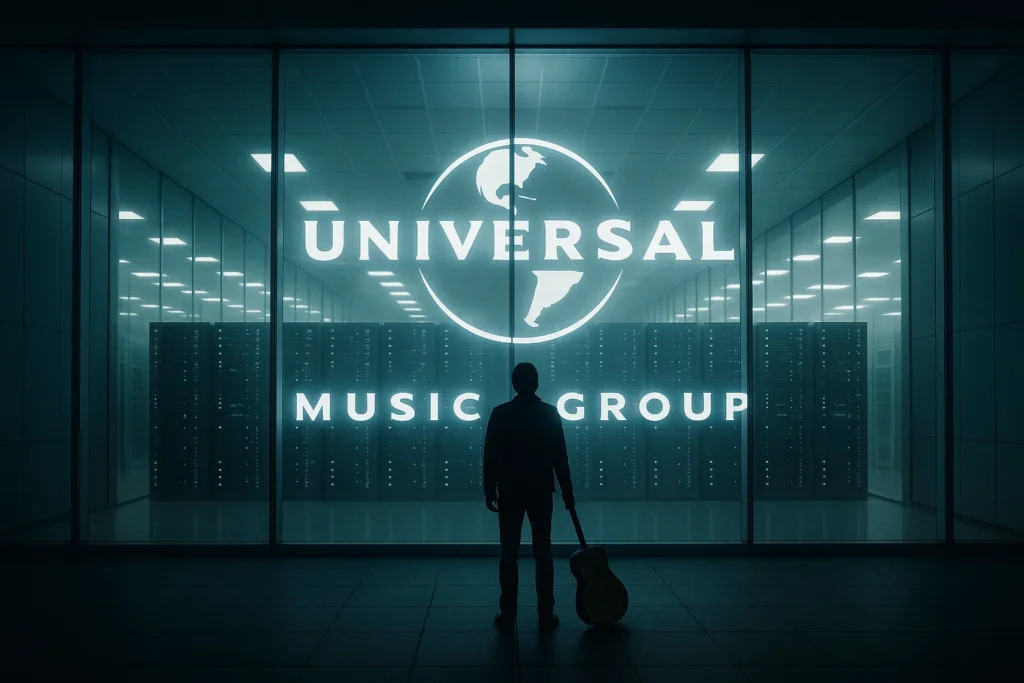The recently announced “strategic partnership” between Udio and Universal Music Group isn’t innovation. It’s capitulation. It’s the sound of a promising startup trading its soul—and its users’ futures—for the false security of a major label’s approval. This deal doesn’t open up the future of music; it slams the door shut, locks it, and hands the key to a boardroom.
From Disruption to Distraction
Udio began with a revolutionary promise: to democratize music creation through AI. But faced with the existential threat of endless litigation and billion-dollar labels circling like sharks, Udio chose assimilation over revolution. The resulting deal transforms it from a serious tool for songwriters into a hobbyist toy, permanently confined within UMG’s walled ecosystem.

The press release boasts of “licensed and protected environments” and “new revenue opportunities.” Translation: creativity fenced off and monetized at both ends. The only revenue flowing will be away from the independent creators who built the platform.
The Losers’ Circle: Why Everyone Loses
This isn’t a win-win; it’s a lose-lose-lose scenario.
- The Udio User Loses: You pay a subscription fee. You pour in your creative energy and original lyrics. And what do you own? Nothing. You cannot copyright the output, pitch it to artists, or collect royalties. You are a sharecropper in a digital field, tilling soil owned by a corporation.
- The UMG Artist Loses: The notion that major artists will see meaningful revenue from this is a fantasy. Any income will be a microscopic trickle after corporate accounting takes its cut. Their artistry becomes training data for derivative content, diluting their brand without compensation or control.
- The Audience Loses: Listeners are offered a future of corporately curated soundalikes instead of genuine, risk-taking art. It’s the Spotify-ification of creativity—the slow death of surprise, risk, and rebellion.
The Illusion of Choice and the Opt-In Trap
The entire model hinges on a fatal assumption: that UMG’s biggest artists will opt-in. Why would they? A-list artists have zero incentive to vaporize their hard-earned uniqueness into an AI content mill. The resulting “licensed library” will be a patchwork of forgotten catalogues and legacy acts chasing residuals—a far cry from the hit-making engine Udio promises.
Furthermore, the logistical cost of maintaining this “opted-in” library will be prohibitive. Every time an artist says “no,” Udio faces the technically monstrous task of “unlearning” that artist from its AI model—a futile attempt to remove one specific ingredient from a fully baked cake.
The Path Not Taken: How This Could Have Been Win-Win
A truly visionary deal would have created synergy, not shackles. Imagine if a platform negotiated for access to the raw components of UMG’s archives: the isolated session stems and vocal takes. This would allow AI to learn the vocabulary of classic music without infringing on copyrights. The label monetizes its vaults, the platform gets clean data, and the user creates wholly owned, original music. That’s a win-win-win.

Instead of learning from the greats, Udio now learns off them—parasitic rather than inspired. It chose a path that serves the corporation first, the artist second, and the creator dead last.
Conclusion: The Inevitable Mothballing
Serious creators will abandon Udio in droves for tools like Suno that still respect the non-negotiable principle of ownership. You can’t call it democratization if the ballot box belongs to Universal.
Without its core users, Udio will become a ghost town of hobbyist novelties. I give it six months before the platform is effectively mothballed, a costly and embarrassing experiment that failed.
The Udio-UMG deal will be remembered not as a pioneering first step, but as a cautionary tale—a testament to what happens when short-term corporate interests sacrifice long-term visionary growth.
The future of music belongs to creators who own their work, and the platforms brave enough to trust them with it.
—Wolfshead





I would say contributing for free and paying for that, peak corporate nonsense. Respecting copyright and creators, but only if it suits our financial interests. This is like paying to do some work for some for free.
It’s even worse, as nothing is copyrighted, nobody prevents people from just taking inspiration and ideas. And who got the whole thing? Universal basically lets people provide them with free inspiration for their AI or use for artists under their contract.
Well, I just described what you already said… it just boggles the mind how a platform can fall so hard on its face.
Udio will not become much if not go away entirely soon, but it will be a great example how not to deal with the AI revolution and copyright.
It’s a total disaster and a complete capitulation. Udio users can’t even download the audio tracks they made previously.
This is good news for Suno as UMG has taken a pawn off the chessboard. Suno is now welcoming new Udio users.